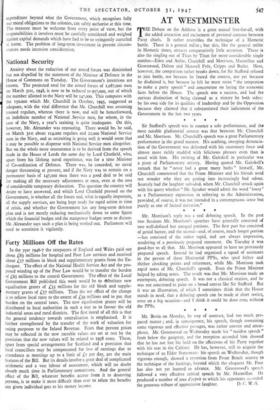AT WESTMINSTER
THE Debate on the Address is a great annual free-for-all, with the added attraction and excitement of personal contests between Party chiefs. It rather resembles the technique of a Homeric battle. There is a general melee ; but this, like the general melee in Homeric times, attracts comparatively little attention. There is also the singling out of Titan by Titan for more considerable single combat—Eden and Attlee, Churchill and Morrison, Macmillan and Greenwood, Dalton and Maxwell Fyfe, Cripps and Butler. Here, however, the comparison rather breaks down, for Sir Stafford refused to join battle, not because he feared the contest, nor yet because he disdained it, but because he felt he must resist "the temptation to make a party speech" and concentrate on laying the economic facts before the House. The speech was a success, and had the curious distinction of being claimed as a victory by both sides : by his own side for its qualities of leadership and by the Opposition because they claimed that it substantiated their indictment of the Government in the last two years.
* * * Sir Stafford's speech was in essence a solo performance, and the most notable gladiatorial contest was that between Mr. Churchill and Mr. Morrison. Mr. Churchill's speech was a great Parliamentary performance in the grand manner. His scathing, sweeping denuncia- tion of the Government was delivered with his customary force and almost more richly studded with felicitous phrases even than is usual with him. His twitting of Mr. Gaitskell in particular was a piece of Parliamentary artistry. Having quoted Mr. Gaitskell's remark that he "never had a great many baths" himself, Mr. Churchill commented that the Prime Minister and his friends need not wonder why they are getting into increasingly bad odour. Scarcely had the laughter subsided, when Mr. Churchill struck again with his query whether "Mr. Speaker would admit the word 'lousy' as a Parliamentary expression in referring to the Administration, provided, of course, it was not intended in a contemptuous sense but purely as one of factual narration."
* * * * Mr. Morrison's reply was a real debating speech. In the past two Sessions Mr. Morrison's speeches have generally consisted of two well-defined but unequal portions. The first part has consisted of genial banter, and the second—and, of course, much longer portion —has consisted of the rather rapid, and not always impressive, rendering of a previously prepared statement. On Tuesday it was good-bye to all that. Mr. Morrison appeared to have no previously prepared speech. Instead he had organised a squad of assistants in the person of three Ministerial PPSs, who sped hither and thither checking points and references, while Mr. Morrison took rapid notes of Mr. Churchill's speech. Even the Prime Minister helped by taking notes. The result was that Mr. Morrison made an extempore, debating speech. It was not a classical oration, and he was not concerned to paint on a broad canvas like Sir Stafford. But it was an illustration, of which I sometimes think that the House stands in need, that a debating speech can be made at short notice, even on a big occasion—and I think it could be done even without the PPSs. * * *
Mr. Bevin on Monday, by way of contrast, had too much pre- pared matter ; and, in consequence, his speech, though containing some vigorous and effective passages, was rather uneven and amor- phous. Mr. Greenwood on Wednesday made his "maiden speech" froth below the gangway, and the reception accorded him showed that he has not lost his hold ott the affections of his Party together with his seat in the Cabinet. He has, however, still to acquire the technique of an Elder Statesman: his speech on Wednesday, though vigorous enough, showed a reversion from Front Bench oratory to the technique of the hustings, beyond which the eloquent Mr. Foot has also not yet learned to advance. Mr. Greenwood's speech followed a very effective critical speech by Mr. Macmillan. He produced a number of jeux d'esprit to which his opponents accorded the generous tribute of appreciative laughter. D. C. W.-S.


































 Previous page
Previous page